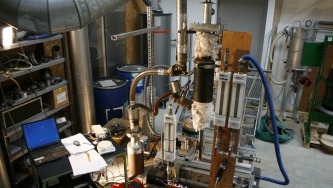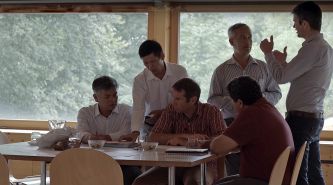

Swiss Partners
Ökozentrum Langenbruck,
www.oekozentrum.ch,
Martin Schmid
Sofies-Emac AG, Zurich,
Martin Fritsch, Hannes Zellweger
Project Type:
Technology:
Country:
Project Status:
Project Start:
End of Project:
Contract:
Documentation
Final Report
Short movies [1] and [2]
Swiss Contribution
The Swiss Ökozentrum Langenbruck has many years of experience in the development of sustainable energy technologies and projects for developing countries. Sofies-Emac has specific expertise in the fields of resource efficiency and cleaner production of food items.
Description
Coffee is often grown on small farms in Peru’s mountainous regions. The fruit pulp is the coffee production’s main biomass waste product. The humid and non-combustible coffee pulp is slightly acidic, hardly compostable or fermentable, not suitable for animal feeding and may pollute the ground water. Another aspect is the high potassium content that was extracted by the coffee plant from the soil.
This REPIC project’s main goal is the development of a simple pyrolysis plant designed for continuous operation. The pyrolysis plant will deliver both heating energy for the drying process and potassium rich bio char that can be used as fertilizer.
In order to disseminate the project’s results more broadly, a workshop was held which brought together local machine manufacturers from Peru and Vietnam. The first prototypes have already been made on-site in both countries.
Results
The developed plant exceeds the set targets: the exhaust gas values are far below the Swiss LRV limits, the plant processes 80 kg/h of wet input, emits 40-70 kW of drying heat and weighs < 600 kg. Operation requires less than 1.5 kW of electrical power. The vegetable carbon passed the EBC test (European Biochar Certificate). For further dissemination, a workshop was held with local machine manufacturers from Peru and Vietnam, and the first prototypes have already been produced locally in both countries. The market price in Peru is estimated at US$ 22,000 to 24,000.
Impacts
The solution developed transforms biomass harvest residues into a valuable material, energy and fertiliser substitute, and at the same time solves a disposal problem. Vegetable carbon as a product is dry, odourless, light and easy to process. With the individual control of the ratio of “charcoal and energy”, different business models are possible. A market for this plant is already emerging. In order to be able to integrate the plant into the entire production process, a project has been started in Vietnam. Suitable partners are still being sought in Peru. In addition to the project, the CharNet.ch network (http://charnet.ch/) was founded at the end of November 2015, which brings together Swiss experts in this field.